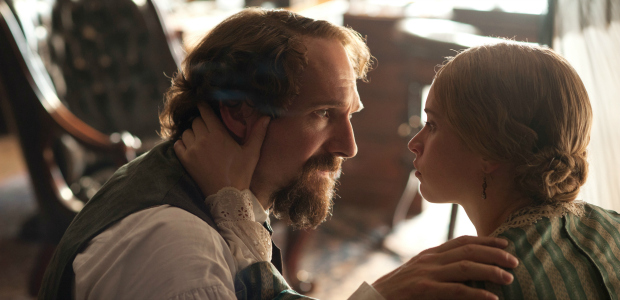The Invisible Woman
Love is fleeting, art is eternal.
Plot summary
Dickens – famous, controlling and emotionally isolated within his success – falls for Nelly, who comes from a family of actors. The theatre is a vital arena for Dickens – a brilliant amateur actor – a man more emotionally coherent on the page or on stage, than in life. As Nelly becomes the focus of Dickens’ passion and his muse, for both of them secrecy is the price, and for Nelly a life of “invisibility”.

Ralph Fiennes has long ago proven to be the foremost actor working today. And, with two features behind him—the bracing Coriolanus and now The Invisible Woman—he’s proven to be one of the most original and invigorating directors. What he brings to his performance he now brings to all the performances: a quiet turbulent emotion—in Coriolanus, the visceral and potent fevers of politics, war, and the media were electrifying; in The Invisible Woman, he presents us with sumptuous tableaux vivant that gasp their way into passionate life. The invisible woman is a mistress. But with an artist, any woman is destined to be the mistress, because first—always—in his heart, preeminent in his passions, will be his art. The best his women can hope for is to be a muse, for whatever time they can.
Here the mistress is Ellen Ternan (Felicity Jones) and the artist is Charles Dickens (Ralph Fiennes). Dickens is in the midst of working on a school play with his friend and collaborator Wilkie Collins (Tom Hollander), and Fiennes’s performance is of a gracious, funny bon vivant and raconteur, a generous-spirited, almost infantile genius; childlike in his curiosity and sense of play, but also equally childlike in his selfishness and capriciousness. He is good with the children because he can talk to them on their own level of wonder and discovery. When he meets Ellen he is smitten, and with the cold-eyed opportunistic understanding of her mother (Kirsten Scott Thomas), the two are soon if not thrust together, at least not thwarted. Dickens’ wife, Catherine (Joanna Scanlan), mother of his ten children, also stands back. Catherine is long suffering, a toy whose novelty has faded quite some time ago, a trepid guest in her own home who hides from her husband when nude like a polite stranger. She is a rock of patience and displeasure—someone has to be the adult—and she puts up with him because he is the premier man of letters of the day, whether he’s boarding her up to keep her separate in the house they share or having her deliver gifts to his mistress. He is an innocent, and with a near-autistic cruelty. It’s not just a case of his bread-winning; she knows she has a duty to maintain the man and a sense of the importance of what she is maintaining (‘he doesn’t realize the profound effect of his own art’). Also, she knows his passions flame bright and then burn out—she’s used to it, and she’s in for the long haul.
Ellen herself is not stupid, nor is she not warned, but that is the nature of one’s feeling of specialness when such a bright light has turned its focus on her. ‘We have fallen in love with a man of standing, Miss Ternan,’ she is told by Catherine. ‘You must share him with his public,’ and she’ll ‘never know who he loves the most.’ We know, of course. And soon she does, too: in the aftermath of a horrific train wreck, he doesn’t attend to her but instead frantically takes care of the scattered pages of his manuscript. She is, later, with his son, a preserver of his memory, his art, keeping his genius safe. She didn’t get the man for long, but she got something far more valuable and important, something that will last longer than the man, longer than she herself. She realizes, like Catherine realized: love is fleeting, art is eternal.











COMMENTS